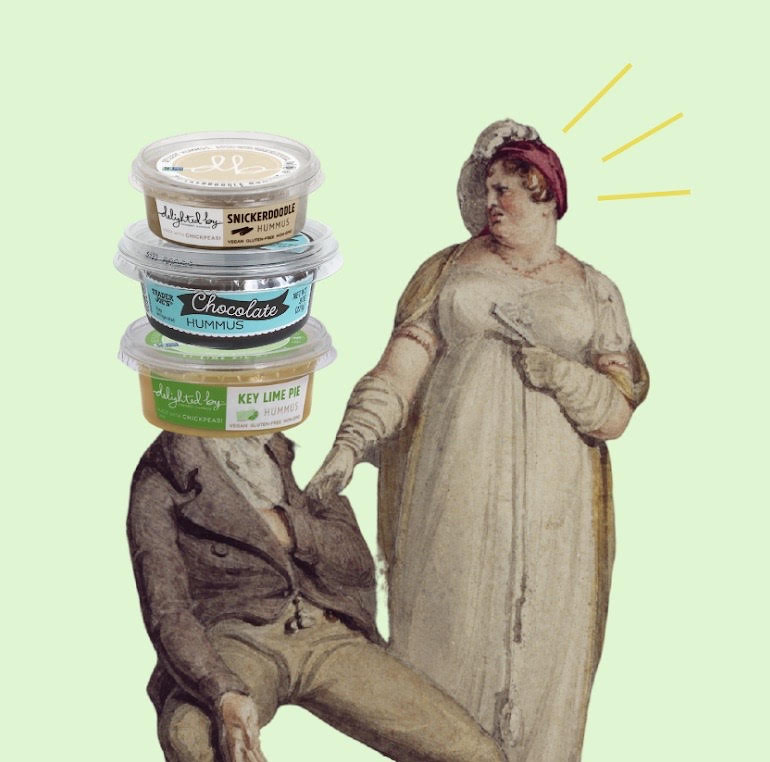Two Words That Should Never go Together: Dessert and Hummus
November 19, 2020
For decades, Americans have kept one dream near and dear to their hearts: the dream of eating junk food without the health consequences or the guilt. Hummus may just be one of the latest and most atrocious victims of this never-ending search for “healthy” and guilt-free gorging. Hummus is an essential dish in Mediterannean and Middle-Eastern cuisines that has been in existence in all of its deliciousness for over 900 years. In recent decades, the dish has become popular in the United States and other Western countries and has recently been “dessertified” into an array of sweet and even elaborate flavors. This dessert-ification of the savory Mediterranean/Middle-Eastern dish is barely recognizable as “hummus’’ and is a misuse of the term itself. It’s an appropriation of traditional hummus that profits off of its association with the popular dish. In addition, the creation of dessert hummus is just part of a larger trend of healthy desserts that don’t live up to their expectations. Most importantly, the sweet flavorings added in dessert hummus are not successfully able to mask the taste of the chickpeas. I could not think of a more perfect dish than traditional hummus and to mess with its ingredients and the customs around it is corrupt.
Marketing dessert hummus as a type of hummus — even if it is labeled as a dessert — is a misrepresentation of the product. A quick Google search of the word “hummus” will bring the user to a clear definition: “a thick paste or spread made from ground chickpeas, sesame seeds, olive oil, lemon, and garlic.’’ Almost all culinary experts agree on these key components of the dish. While the Arabic word for hummus literally translates to just “chickpea,” the cultural view of hummus is the savory dish that includes much more than just the legume. While dessert hummus is made with a base of chickpeas, the savory flavorings that make up traditional hummus are instead swapped for sugar, coconut milk, coconut oil, vanilla extract, and other sweet flavorings. The sweet dish is just too different from the cultural understanding of hummus for it to even be considered a type of hummus.
Dessert hummus does not stand alone as a so-called “healthy dessert alternative.” It joins dozens of other healthy desserts that have trended at some point. The company that first successfully created and sold dessert hummus is a brand called Delighted By Hummus — founded by a young American woman named Makenzie Marzluff in 2016 after she experienced a year of personal transformation in the South Western United States and heard a message from within her telling her to “spread her glitter.” Hummus is not the only culturally important food product from a culture other than her own that Marzluff has tinkered with. She founded another company called KAKAO that sells Peruvian Cacao intended to be made into “drinking chocolate to be used in sacred rituals for heart-opening, connection, and creativity.” (Along with this, she offers a training program to teach people how to lead their own Cacao ceremonies and connect with the “Spirit of Cacao.”) Mackenzie and “wellness specialists” like her profit off of the adaptation of foods culturally significant in places outside of the U.S, to fit American’s desires. Dessert hummus is a trend that will fade away whenever Makenzie and her colleagues find a new foreign food product that catches their eye, but traditional hummus has been a staple in Mediterranean and Middle Eastern cuisines for centuries and is not going anywhere.
Since the creation of Delighted By Hummus, other brands have gotten into the dessert hummus industry. Trader Joes along with Aldi sell a couple of flavors of dessert hummus. Boar’s Head, a deli meats and cheese company has thrown their hat into the ring, making a dark chocolate dessert hummus flavor as well as pumpkin pie dessert hummus. Even Sabra, one of the world’s leading producers and suppliers of hummus, has dipped its toes into the waters and released a chocolate flavor that the company markets as a “dessert dip and spread” rather than hummus, which is slightly more acceptable.
Even beyond the question of whether or not dessert hummus is mislabeled or just a health trend, there is the ultimate question of whether or not it tastes good. The consensus from myself and many food critics and reviewers is “no”. Even with all the added flavorings and sweeteners, dessert hummus still leaves the consumer with a distinct chickpea aftertaste and, their sweet tooth, not completely satisfied. If it takes spoonfuls of sugar and other sweeteners to only slightly mask the natural legume-y flavor of chickpeas, that might be a sign. I don’t want chickpeas in my dessert and chickpeas don’t want to be made into a dessert because ultimately, chickpeas belong in wonderful savory dishes like traditional hummus.

Photo Credit: Natanya Katz ’21




